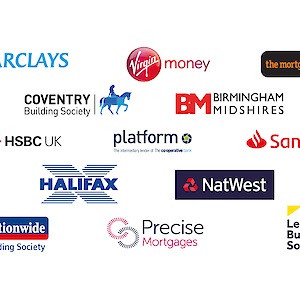


Head of Content

Mortgage Advisor & Director

Having an Individual Voluntary Arrangement (IVA) can make it difficult to get a mortgage, but not necessarily impossible. If you do have bad credit, such as an IVA, it’s even more important to seek expert advice when applying for a mortgage.
Our guide to getting a mortgage with an IVA explains what lenders are looking for, whether it’s possible to get accepted, and how a mortgage broker can help.
What is an IVA?
An individual voluntary arrangement (IVA) is a legally binding document between a creditor and their debtor(s) that is set up by insolvency practitioners and approved by a court. Most IVAs last for five years, during which time the IVA holder repays the arranged amount to their creditors without interest charges, which are frozen. They remain on your credit file for 6 years, and this impacts your ability to take out any additional credit.
Having an IVA can, therefore, also make it difficult to successfully apply for a mortgage. Aside from the credit score damage, it's incredibly difficult to save a deposit when repaying an IVA, as you’ve committed to using all disposable income towards settling the IVA. In some circumstances, a gifted deposit may be considered as a way around this, but it depends on the lender.
You are legally required to declare any IVAs you have when applying for a mortgage.
Can you get a mortgage with an IVA?
It’s not impossible to get a mortgage while in an IVA, but it’s very difficult. You’ll need to get permission from your insolvency practitioner - which is fairly unlikely.
The other stumbling block is that there are very few lenders willing to approve a mortgage while the borrower has a current IVA in place, but some specialist lenders may in certain cases. Once your IVA is repaid (or satisfied), there will be more lenders available to you, but the majority of lenders prefer you to have been 3-6 years clear of your IVA before they will consider a mortgage application.
Speaking to a mortgage broker is highly recommended if you have, or have had, an IVA, as there are substantial differences in the acceptance criteria of lenders. It's perfectly possible that one lender will accept someone who has had an IVA in the past two years, whereas another would refuse them for the same reason.
How will the IVA affect my mortgage?
This depends on the lender, and how long ago your IVA was satisfied. Those few applicants able to get a mortgage with a live IVA will be subject to much higher interest rates, given the high-risk nature of the application.
Once your IVA is satisfied, how it impacts the mortgage application will vary from one lender to the next. Some will decline applications for 3-6 years post IVA, whereas others may accept them, but increase the deposit requirement or reduce the LTV (loan-to-value) available to you. Usually, you’ll also have to pay higher rates than those applicants with a strong credit history.
Can you get a joint mortgage with an IVA?
Yes, it’s possible to get a joint mortgage when one of the applicants has an IVA. In fact, this may improve the chances for the IVA holder, especially if the other applicant has a strong credit rating. However, the person without the IVA will be negatively impacted.
Leaving the applicant with the IVA off the application is technically an option, but keep in mind that this would mean that they are not on the deeds to the property. It’s also likely to impact affordability, as their income won’t be considered if they’re not on the mortgage application.
How long should you wait to apply for a mortgage?
There’s no reason why you can’t apply for a mortgage as soon as the IVA has been discharged, but keep in mind that the IVA will remain on your credit files for six years in total.
Although some lenders prefer the full six years to have passed before they will consider an application, your chances of securing a mortgage gradually improve over time. For example, more than 40 mortgage providers are available for prospective borrowers whose IVA was satisfied between two and five years ago.
After the six-year mark, the issue will be removed from your credit reports and should not have an impact any future mortgage applications.

Claire Jopson - Senior Mortgage Advisor
Lending criteria

Alongside typical mortgage criteria, lenders tend to specifically focus on the below factors to assess whether applicants with individual voluntary arrangements are eligible for a mortgage:
- When the IVA was satisfied: Most mortgage providers will need the IVA to be satisfied. Only a handful will approve you one year after discharge, but the number steadily increases after 2 years
- Deposit amount: You will typically need a larger deposit, in some cases as much as 30%, although many lenders accept a 10-20% deposit if the IVA was satisfied more than 3 years ago
- Financial conduct: Most mortgage lenders will expect you to have paid all bills and any on time and in full since your IVA was satisfied. Anything that you can do to improve your credit score will be beneficial and show responsible financial conduct
- Stable income: The more stable of an income you can provide proof of, the easier any post-bad credit mortgage application will be. Many lenders will prefer you to have a full-time employed income, although specialist lenders will usually consider retired and self-employed applicants with an adverse credit history
The criteria above was sourced from Criteria Brain and Knowledge Bank.
How to get a mortgage with an IVA
We recommend following the steps below to begin your mortgage application the right way:
Get your documents ready: Having the necessary paperwork to hand can help save time in the long run. You’ll need proof of ID, address and three months’ bank statements. In addition to this, you should provide proof that your IVA has been discharged in the form of a completion certificate from your insolvency practitioner.
Check your credit reports: This is highly recommended as it will allow you to review the status of your IVA, but also to pick up on any inaccuracies and outdated information. Requesting to have these errors removed can strengthen your application. Head to Checkmyfile to access a trial and download your reports for free.
Speak to a mortgage broker: There are mortgage brokers at Teito who specialise in helping borrowers with IVAs get onto the property ladder. With their knowledge, experience and lender contacts, they can increase your chances of mortgage approval as well as ensure you secure the most favourable interest rate available.
Ready to get started? You can compare the latest mortgage rates or take advantage of a free, no-obligation chat with a bad credit mortgage specialist below:

Connect with a bad credit mortgage specialist
How much will you be able to borrow?
Having a satisfied IVA may impact the amount you can borrow, depending on lender's criteria. While loan size is largely determined by your affordability, lenders could reduce the maximum multiple they are willing to use based on your credit history. Lenders tend to offer 4.5-6 times your annual income, depending on your income level and type, but it's possible that this could be capped at 4-4.5 times your income if you have bad credit.
Some lenders may also reduce the maximum LTV available to you, which means you'd need a larger deposit to borrow the same amount as someone without credit issues. However, this is not always the case, so it's crucial to speak to a broker with specialist knowledge in this area if you're looking to maximise your borrowing.
You can use our calculator below to get a rough estimate of how much you could borrow with your current deposit, but please note that this does not take credit history into consideration:
Are there specialist mortgage lenders for this type of adverse credit?
Yes, there are specialist adverse credit lenders, who can be more flexible with criteria surrounding IVAs, however, a few high street lenders may consider those with discharged IVAs.
The best mortgage lenders for IVA holders will depend on the circumstances surrounding their IVA, such as how long it has remaining, whether they’ve missed any payments, and so on.
These lenders will consider mortgage applications from people with IVAs that were discharged within the last three years:
|
Mortgage Lender |
Criteria for Borrowers With IVAs |
|
Will consider applicants as long as they didn’t miss payments on their IVA and have no other instances of bad credit that occurred in the last three years. |
|
|
Consider mortgages under these circumstances but their final lending decision will be subject to internal credit scoring. |
|
|
States that an applicant’s IVA must have been discharged for at least two years before they will consider approving them for a mortgage. |
These lenders may consider mortgage applications where the IVA was discharged between three and six years ago:
|
Mortgage Lender |
Criteria for Borrowers With IVAs |
|
Will lend if the issue was discharged at least three years ago, subject to credit scoring and thorough underwriting checks. |
|
|
Will offer mortgages for houses at up to 95% loan-to-value if the IVA was discharged at least three years ago. The same applies for flats or apartments, with the LTV cap falling to 80% for this property type. |
|
|
Will lend under these circumstances with no specific caveats. |
Will your mortgage rate be higher?
If you have an IVA, mortgage rates can be around 1-2 percentage points higher. The good news is, however, it may be possible to secure significantly lower mortgage rates after your IVA is discharged.
Those applicants with IVAs discharged 3-6 years ago may even be considered by high street lenders if they have additional deposit to put down.
You can get a free rates comparison of deals from across the entire market from one of our bad credit mortgage brokers below. This tool has been set to show results from specialist bad credit mortgage lenders by default but you can change it to display the whole of the market via the filters tab in the bottom left.
Compare Rates
Showing Top Result Results
No results matching your criteria
Lender Details
Product Details
Will an IVA stop you from remortgaging?

Not necessarily, it’s possible to get a bad credit remortgage if you have an active IVA. In some cases, homeowners can even remortgage to release equity to help them settle the IVA debt. When refinancing under these circumstances, most mortgage providers cap the loan-to-value ratio at 85%.
If your IVA has been discharged, there’s no reason why you can’t apply for a remortgage immediately, but you'll likely see similar challenges. However, if you have a good level of equity in your home, it will usually be easier than it is for first-time buyers.
How a Teito mortgage broker can help you
At Teito we specialise in helping customers with all kinds of bad credit, including IVAs, to secure their best mortgage deal.
As a whole-of-market brokers we have access to those specialist lenders who can be more flexible with bad credit criteria, and often are able to offer exclusive deals for our customers.
Here are some of the other benefits of choosing Teito for your mortgage needs:
-
You can get a free rate comparison of the whole market, and specifically bad credit deals
-
Our mortgage brokers are 5-star rated on Trustpilot and Google
-
We are experts in securing mortgages for those with IVAs
-
Your initial consultation is always free of charge
Ready to get started? Make an enquiry online to arrange a free, no obligation chat with a specialist bad credit mortgage broker today.
FAQs
Yes, you have a legal obligation to disclose this to your mortgage lender, and you’ll need to declare it to a broker in order for them to help you effectively. It’s best to mention an IVA, even if it’s satisfied, as this could still be on your credit file, and lenders will always prefer honesty.
Choosing an Adviser
Selecting a qualified and experienced mortgage adviser is of great importance. To choose a suitable adviser, evaluate their qualifications, experience, and reputation, and ensure they are regulated by the Financial Conduct Authority (FCA).
Read reviews from previous clients and make sure they provide a clear explanation of the products and services they offer, as well as the fees and charges associated with them.





















































































































































